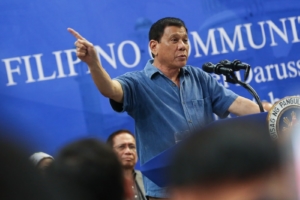Midterm Election in the Philippines Helps Duterte

Millions of voters marched to the polls on May 13, 2019, for the 2019 midterm election in the Philippines. More than 18,000 government positions were up for election, but all eyes were on the Senate race due to its influence on President Rodrigo Duterte’s authoritarian agenda.
All 12 Duterte-backed Senate candidates won by a landslide, demonstrating the popularity of President Duterte’s policies. Three candidates in the spotlight were former special assistant to President Bong Go, former police chief and the architect of Duterte’s drug war, Ronald “Bato” dela Rosa, and Imee Marcos, the daughter of the former dictator, Ferdinand Marcos.
The Consolidation of Power
The results indicate that the destructive drug war plaguing the Philippines is far from over. So far, the conflict has resulted in a total of 22,983 deaths since Duterte took office in 2016, according to the Philippine National Police. This statistic includes suspected drug users, drug pushers and civilians living in impoverished communities, all of whom the President and his police force see as collateral damage.
During Duterte’s war on drugs, not a single drug lord received apprehension. Further, the drug war has not effectively reduced drug use or decelerated the drug trade in the Philippines. On the contrary, the drug war has caused the prices of methamphetamines, or shabu, to lower by a third of the original price, increasing the accessibility and prevalence of the drug.
Additionally, Duterte’s policies include reinstating the death penalty and lowering the age of criminal liability from 15 to 9 years old. Before the midterm elections, a portion of the Senate did not approve of Duterte’s policies, resulting in political gridlock. Now, Duterte’s newly-consolidated legislative power gives him the upper hand in following through with these policies.
Duterte’s High Approval Rating
Despite Duterte’s undemocratic tactics, his approval rating remains high at 81 percent. Duterte has garnered support for his strongman leadership and his promises to keep the streets safe. His popularity reveals the nation’s fragility and puts into question the stability of the Philippines’ political structures.
The Opposition
The opposition still holds a stake in the political landscape despite the lack of congressional representation after the midterm election in the Philippines.
The opposition includes key figures such as former Senator Leila de Lima and Rappler journalist, Maria Ressa. Duterte has imprisoned both Lima and Ressa in order to silence their critiques against his administration, but human rights groups are dedicated to releasing them from prison, claiming that they received conviction without a fair trial. These human rights groups include the Human Rights Watch, Amnesty International and FORUM-ASIA, and they are determined to hold the Filipino government accountable for all human rights violations.
Efforts abroad are also looking to combat the Duterte administration, such as the Malaya Movement. The Malaya Movement is a U.S.-based organization that organizes events such as rallies and summits and mobilizes individuals to petition against the drug war and government corruption in the Philippines. Its mission is to broaden the opposition against Duterte’s policies and endorse freedom and democracy in the Philippines.
– Louise Macaraniag
Photo: Wikimedia Commons
